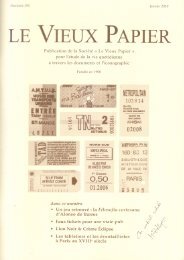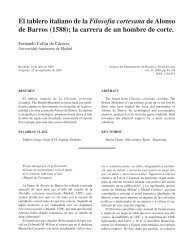Board games from the city of Vijayanagara (Hampi ... - Gioco dell'Oca.
Board games from the city of Vijayanagara (Hampi ... - Gioco dell'Oca.
Board games from the city of Vijayanagara (Hampi ... - Gioco dell'Oca.
Create successful ePaper yourself
Turn your PDF publications into a flip-book with our unique Google optimized e-Paper software.
44<br />
B OARD G AME S TUDIES 6, 2003<br />
to gambling, so it seems quite unusual that a gambling table was made out <strong>of</strong> such representative<br />
and precious materials. It is also reminded that <strong>the</strong> <strong>games</strong> table was made for<br />
a prince-bishop, who might have been more bound to <strong>the</strong> moral codex <strong>of</strong> his time.<br />
Considering <strong>games</strong> and gambling, though, <strong>the</strong>re has always been a hypocrysity – on <strong>the</strong><br />
one hand, gambling was condemned and <strong>the</strong>re had been laws against it, on <strong>the</strong> o<strong>the</strong>r<br />
hand it had been a privilege <strong>of</strong> <strong>the</strong> court and nobility to gamble. Still, to be represented,<br />
nobility mainly used chess or o<strong>the</strong>r tactical <strong>games</strong>, and not <strong>games</strong> <strong>of</strong> chance.<br />
The <strong>games</strong> tables with war allegories, as well as <strong>the</strong> board <strong>games</strong> <strong>from</strong> Eger prove, that<br />
<strong>games</strong> not only had a recreational function and served as past-times, but were highly<br />
representative and had symbolical meanings. Chess and o<strong>the</strong>r tactical <strong>games</strong> were part<br />
<strong>of</strong> <strong>the</strong> kunstkammer, where <strong>the</strong> whole world was to be collected. Maybe here we see<br />
ano<strong>the</strong>r expression <strong>of</strong> <strong>the</strong> “microcosm-macrocosm” idea <strong>of</strong> <strong>the</strong> time, as a board game<br />
could also be seen as a war battle and express power in <strong>the</strong> small – opposed to <strong>the</strong> real<br />
power in a war. But also <strong>games</strong> <strong>of</strong> chance could be combined with war allegories. Games<br />
and gambling had been an expression <strong>of</strong> power – for example at <strong>the</strong> court <strong>of</strong> Louis XIV,<br />
where it was <strong>the</strong> duty <strong>of</strong> each courtier to be at <strong>the</strong> gambling tables every day. Even though<br />
in France, gambling was an important part <strong>of</strong> <strong>the</strong> court society and served to gain and<br />
represent power, <strong>the</strong>re are no such representative <strong>games</strong> tables in France. German-speaking<br />
countries in many aspects imitated <strong>the</strong> etiquette <strong>of</strong> <strong>the</strong> French court, also according<br />
to <strong>the</strong> so-called “appartements”, afternoon or evening meetings at court for gambling.<br />
Those practices <strong>of</strong> gambling at court expressed <strong>the</strong> privilege <strong>of</strong> nobility to gamble, even<br />
though <strong>of</strong>ten <strong>the</strong>re were laws which forbid gambling. In most European countries, <strong>the</strong>re<br />
existed more or less precious <strong>games</strong> tables, but only in <strong>the</strong> German-speaking courts card<br />
tables and board game tables were combined with symbols <strong>of</strong> war. Maybe it was <strong>the</strong><br />
political situation in Germany which lead to <strong>the</strong> development <strong>of</strong> such <strong>games</strong> tables.<br />
Unlike in France or o<strong>the</strong>r European countries, <strong>the</strong>re was no absolutism possible at<br />
German courts, as Germany consisted <strong>of</strong> many small territorial courts, more or less powerful.<br />
The different sovereigns not only had to claim <strong>the</strong>ir power against strong countries<br />
like France, but also had <strong>the</strong>ir own rivalries. This might be a reason why <strong>games</strong> tables as<br />
a type <strong>of</strong> furniture which represented <strong>the</strong> privilege <strong>of</strong> nobility to gamble, but also <strong>the</strong><br />
privilege <strong>of</strong> having <strong>the</strong> education and time to play board <strong>games</strong> like chess, were used as<br />
representative means to claim <strong>the</strong> sovereign’s power. All absolutist sovereigns wanted to<br />
show <strong>the</strong>ir power. One means was to have many very splendid “divertissements”, entertainments<br />
like hunts, balls, <strong>the</strong>atre performances, etc. <strong>Board</strong> and card <strong>games</strong> were always<br />
part <strong>of</strong> those “divertissements”, thus <strong>the</strong>re was a need for representative <strong>games</strong> tables. The<br />
fact that in German-speaking courts those <strong>games</strong> tables were combined with symbols <strong>of</strong><br />
war to allude to a certain power <strong>of</strong> <strong>the</strong>ir sovereign could be read in <strong>the</strong> context <strong>of</strong> <strong>the</strong>ir<br />
need to express <strong>the</strong>ir claim to an absolutistic power.







